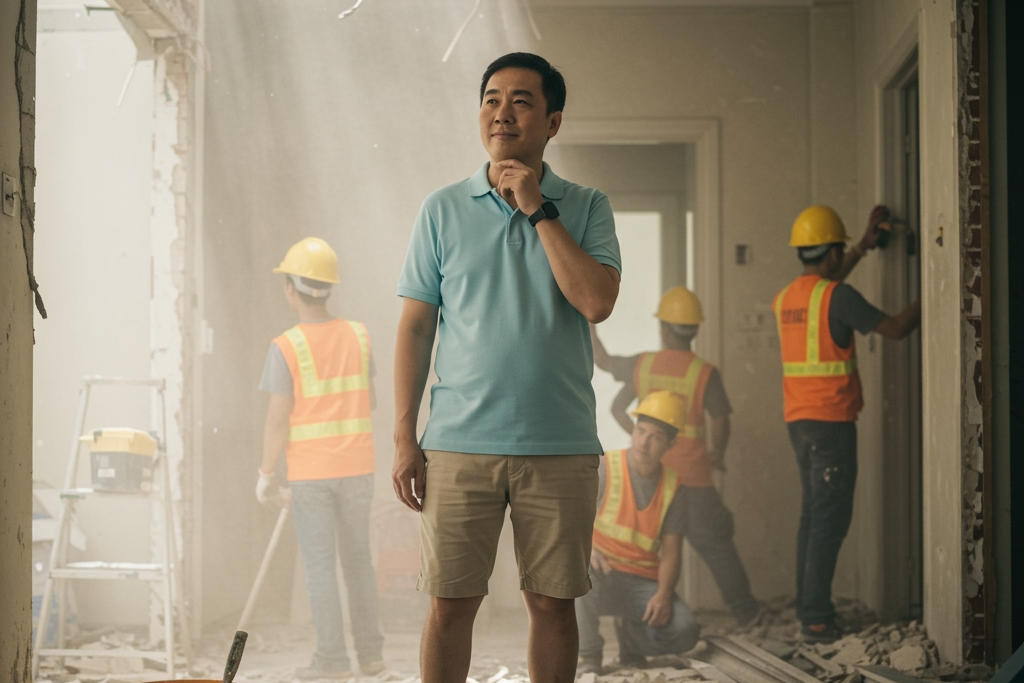Navigating Your Renovation Journey with Confidence
Embarking on a renovation in Singapore is a transformative journey – one that reshapes a house into a personalised sanctuary. This path from dream to reality is often lined with challenges, including regulatory requirements, budget constraints, and time management.
The most pivotal decision you will make is selecting a renovation contractor in Singapore – a partner who can either bring your vision to life or create unforeseen obstacles. This guide is crafted to be your ultimate resource, equipping you with the essential insights to confidently hire trusted renovation experts.
Understanding the Role of a Renovation Contractor in Singapore
Renovation contractors are the cornerstone of any home improvement project. They manage everything from conceptual design to execution, ensuring every element aligns with your expectations.
Moreover, in Singapore, where regulations and standards are stringent, a knowledgeable contractor can navigate compliance requirements seamlessly, saving you time and stress.
Why Hiring a Licensed Renovation Contractor Matters
In Singapore, the importance of hiring a licensed renovation contractor cannot be overstated. Licensed contractors are not only vetted for quality and reliability but are also updated with the latest industry standards and building codes.
By choosing a registered professional, you mitigate the risks of legal issues and subpar workmanship that could compromise your renovation project.
Steps to Find the Right Renovation Contractor in Singapore

1. Research and Referrals: Start by gathering recommendations from family, friends, or online communities. Review portfolio samples and client testimonials to gauge their expertise and work quality.
2. Verify Credentials: Confirm their licensing through the relevant authorities in Singapore, ensuring they adhere to all necessary regulations and standards.
3. Conduct Interviews: Meet with potential contractors to discuss your vision, project details, and budget constraints. This meeting is an opportunity to assess their communication skills and professionalism.
4. Request Detailed Quotes: A reputable contractor will provide comprehensive quotes that outline all costs, timelines, and project scope, avoiding unexpected expenses down the line.
5. Sign a Clear Contract: Ensure all agreements, including payment schedules, are documented in a detailed contract. This protects both parties and establishes clear expectations.
Common Challenges and How Your Contractor Can Help
Renovation projects often come with a unique set of challenges – unexpected structural issues or material delays can derail your timeline.
A seasoned renovation contractor in Singapore will anticipate these hurdles, offering solutions and alternatives to keep your project on track. Their experience becomes invaluable in managing resources and optimising the workflow to meet your deadlines effectively.
Maximising Your Renovation Investment
Your home renovation is a significant investment, and maximising its return starts with strategic planning. Work with your contractor to set clear goals, prioritise enhancements, and choose quality materials that enhance both the aesthetics and functionality of your space.
A skilled renovation contractor can help you balance innovative design ideas with practical considerations, ensuring lasting satisfaction with your renewed living environment.
What to Expect from This Definitive Guide for Hiring Trusted Experts
This guide cuts through the noise to provide a clear, step-by-step framework for hiring a reliable renovation contractor in Singapore. We will cover everything from defining your initial vision and understanding regulatory requirements to meticulously vetting candidates and crafting a watertight contract.

By the end, you will be equipped to identify true professionals, ask the right questions, and manage your project effectively from start to finish.[/caption]
Laying the Foundation: Defining Your Renovation Vision and Requirements
Before you even think about contacting a contractor, the most crucial work begins with you. A clearly defined plan is the bedrock of a successful renovation, preventing miscommunication and ensuring the final result meets your expectations.
Clarifying Your Needs and Desires: Aesthetic, Functional, and Lifestyle
Start by creating a detailed brief. Move beyond general ideas and think about the specifics. Aesthetically, what style are you aiming for – minimalist, industrial, or classic?
Functionally, how do you need the space to perform? Do you need more storage, an open-concept kitchen for entertaining, or a dedicated home office? Consider your lifestyle. A family with young children has different needs than a couple who works from home.
The more detailed your vision, the better a contractor can understand and price your project accurately.
Setting a Realistic Budget and Timeline for Your Renovation Project
Your budget dictates the scope of your renovation. Research typical costs in Singapore to set a realistic figure. Be aware that renovating older properties can be more expensive; for example, resale HDB flats can cost up to 40% more to renovate than new ones due to the need for more extensive work like rewiring and hacking.
Always include a contingency fund of 10-15% of your total budget to cover unexpected issues that may arise. Similarly, establish a realistic timeline, factoring in time for design, permits, material procurement, and the construction itself.
Understanding Regulatory Requirements and Permits in Singapore
Singapore has strict regulations governing renovations, especially for HDB flats. Certain works, such as hacking walls, altering windows, or relocating plumbing, require permits from the Housing & Development Board (HDB) or the Building and Construction Authority (BCA). Your contractor must be knowledgeable about these rules and be licensed to carry them out. Failing to secure the right permits can result in orders to undo the work at your own expense.
When to Consider an Interior Designer vs. a Renovation Contractor (and When You Might Need Both)
Understanding the different roles is crucial. An interior designer (ID) focuses on the conceptual and aesthetic aspects—space planning, design concepts, material selection, and 3D renderings. A renovation contractor is the builder who brings the design to life, managing the technical execution, manpower, and construction schedule.
If you have a clear design vision and detailed plans, you might work directly with a contractor. If you need help developing a cohesive design, managing complex aesthetics, and sourcing specific finishes, an ID is invaluable. Often, the best solution involves both: the ID creates the vision, and the contractor executes it, with the ID overseeing the project to ensure design integrity.
The Hunt for Trust: Your Step-by-Step Vetting Framework for Singapore Contractors
With your vision defined, it’s time to find the right professional. This vetting process is non-negotiable and will protect you from potential pitfalls.
Start with Credentials: The Non-Negotiable BCA-Registered Contractor Status
In Singapore, the first checkpoint is official registration. For HDB renovations, it is mandatory to engage a contractor listed on the Directory of Renovation Contractors (DRC). This ensures they have the necessary training and understanding of HDB’s technical requirements.
For private properties, engaging a BCA-registered contractor is a critical mark of legitimacy. This confirms the company is registered with the BCA and meets specific standards, providing a baseline of accountability. Never engage a contractor who cannot provide proof of these essential credentials.
Portfolio Power: Analysing Past Projects for Quality, Style, and Relevance
A portfolio is more than a collection of pretty pictures; it’s evidence of capability. Look for projects similar to yours in scale and style.
Scrutinise the details: are the grout lines clean? Are the paint edges sharp? Is the carpentry well-finished? If you have specific needs, like installing a durable vinyl fencing system or complex roofing with tiles, look for direct evidence of this experience in their past work. A strong portfolio demonstrates consistent quality and technical skill.
Reputation is Key: Checking Reviews, Testimonials, and Active References
Go beyond the curated testimonials on a contractor’s website. Search for independent reviews on forums and social media to get a more balanced view. Pay attention to how the contractor responds to negative feedback.

Most importantly, ask for references from recent and past clients. A confident contractor will happily connect you with satisfied homeowners. Speaking to a previous client can provide invaluable insights into the contractor’s communication style, reliability, and after-service support.
Experience Matters: Matching Contractor Expertise to Your Project Type
Not all contractors are created equal. Some specialise in residential HDB renovations, while others focus on large-scale commercial projects or landed properties. If your project involves specialised work, you may need a niche expert.
The Interview Stage: Asking the Right Questions to Uncover Genuine Expertise
Once you’ve shortlisted a few candidates, the interview process will help you make your final decision. This is your opportunity to gauge their professionalism, transparency, and suitability for your project.
Communication and Transparency: Signs of a Reliable and Professional Partner
Effective communication is the lifeblood of a successful renovation. During your meeting, assess their responsiveness.
Do they listen to your ideas and provide clear, thoughtful answers?
A good contractor should be a proactive partner, offering suggestions and flagging potential issues, not just passively taking orders. Transparency about their process, potential challenges, and costs is a hallmark of a trustworthy professional.
Understanding Their Renovation Process: From Design Interpretation to Handover
Ask each contractor to walk you through their standard operating procedure. How do they translate your design brief into an actionable plan? Who will be your primary point of contact? How do they manage subcontractors and the procurement of building materials?
A well-defined process, including regular updates and site meetings, indicates an organised and professional operation.
Some forward-thinking firms may even use a drone for initial site surveys on larger properties to get a comprehensive overview.
Financial Stability and Fair Payment Structures: Protecting Your Investment
Financial instability is a major red flag. In Singapore’s S$6 billion renovation sector, financial disputes are unfortunately common.
In 2024 alone, prepayment losses in the renovation sector were the highest across all industries, amounting to approximately $728,000.
Protect yourself by inquiring about the company’s registration and financial health.
A fair payment structure is typically milestone-based: a reasonable deposit (e.g., 10-20%), followed by progressive payments upon completion of key stages, and a final payment after handover and defect rectification. Avoid contractors who demand large upfront payments.
Insurance and Liability: Ensuring Comprehensive Coverage for Your Project
A professional contractor must have adequate insurance. This includes public liability insurance, which covers damage to your property or your neighbours’ property, and Work Injury Compensation Insurance for their workers.
Ask to see their insurance certificates.
Without proper coverage, you could be held liable for accidents or damages that occur during the renovation, exposing you to significant financial risk.
Problem-Solving Scenarios: Assessing Adaptability and Crisis Management Skills
Renovations rarely go exactly as planned. Unexpected structural issues, material delays, or design changes can occur. Present a hypothetical problem to your potential contractor.
For example, “What would you do if a specified tile is out of stock and the delay impacts the timeline?” Their response will reveal their problem-solving skills, resourcefulness, and ability to manage stress.
A capable contractor will have contingency plans and a calm, solution-oriented approach.
Crafting the Agreement: Ensuring a Watertight Renovation Contract in Singapore
A verbal agreement is not enough. A detailed, legally sound contract is your ultimate protection and the foundation for a successful working relationship.
Essential Components of a Comprehensive Singapore Renovation Contract
Your contract should be exhaustive and leave no room for ambiguity. Key components must include:
- Detailed Scope of Work: A line-by-line breakdown of all tasks, including specific brands and models for materials and fittings.
- Cost Breakdown: A clear itemisation of costs for labour, materials, and any other fees.
- Payment Schedule: Clearly defined payment milestones tied to project completion stages.
- Project Timeline: A detailed schedule with a start date, key milestones, and a projected completion date.
- Defect Liability Period: A clause specifying the warranty period (typically 12 months) during which the contractor is responsible for rectifying any defects.
- Dispute Resolution Clause: An agreed-upon method for resolving disagreements.
Avoiding Common Red Flags in Contractor Proposals and Contracts
Be vigilant for warning signs. Vague descriptions like “supply and install kitchen cabinet” without specifying materials, dimensions, or hardware are red flags.
Beware of contracts that are overly simple or quotes that are significantly lower than others, as they may hide costs that will appear later.
Ensure any verbal promises made during discussions are explicitly written into the final contract.
Project Management & Oversight: Your Role During the Renovation
Once the work begins, your involvement is still crucial. Active oversight ensures the project stays on track and meets your quality standards.
Establishing Clear Communication Channels and Regular Reporting Structures
Agree on a primary communication method (e.g., a dedicated group chat) and a schedule for regular updates. This keeps everyone aligned and ensures that questions or concerns are addressed promptly.
A weekly site meeting with your contractor or project manager is highly recommended.
The Importance of Regular Site Visits and Progress Monitoring
While you hire a contractor to manage the project, regular site visits allow you to see the progress firsthand and spot potential issues early.

Check if the work aligns with the agreed-upon plans and if the quality of workmanship is up to standard. This is your chance to verify that the correct materials are being used and installed properly.
Handling Variations, Change Orders, and Unexpected Challenges Proactively
Changes are often unavoidable. If you decide to make a change or an unexpected issue arises, address it through a formal variation or change order.
This document should detail the new scope of work, the associated costs (or savings), and any impact on the timeline. Both you and the contractor must sign it before the new work begins, preventing disputes over “he said, she said” scenarios.
Maintaining Quality Control Throughout Every Phase of the Renovation
Quality control is an ongoing process, not a final check. From the initial demolition and masonry to the final carpentry and finishing touches, maintain a keen eye for detail. Take photos to document the progress, and don’t hesitate to raise concerns with your contractor immediately. A good contractor will welcome your involvement and address issues professionally.
Post-Renovation: Handover, Warranties, and Future-Proofing Your Home
The completion of construction is not the end of the journey. The final phase is critical for ensuring long-term satisfaction with your renovated home.
The Final Walkthrough and Comprehensive Defect Rectification Process
Before making the final payment, conduct a thorough walkthrough with your contractor. Create a detailed list of any defects, no matter how minor – scratches on a surface, a misaligned cabinet door, or a faulty light switch.
A professional contractor will formally acknowledge this list and schedule a time to rectify all issues. Only when you are completely satisfied with the rectifications should you release the final payment.
Conclusion
Hiring a renovation contractor in a dynamic market like Singapore requires diligence, foresight, and a clear strategy. By defining your vision, meticulously vetting candidates based on credentials like BCA registration, analysing their portfolios for relevant expertise, and insisting on a comprehensive contract, you significantly mitigate risks and set the stage for success.
Remember, the right contractor is more than a builder; they are a partner in realising your dream home. As the global Interior Design Services market continues to grow, the demand for skilled and trustworthy professionals will only increase. Armed with the insights from this guide, you are now prepared to navigate the renovation landscape and confidently select an expert who will deliver quality, value, and peace of mind.


